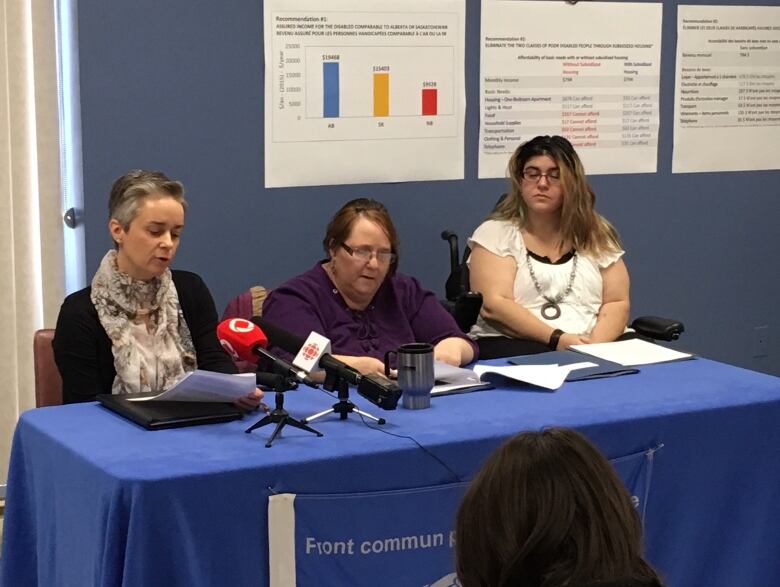Study finds disabled people living in 'deep poverty'
'To me it's unacceptable,' says study author Julie Gaudet. 'We're not living in a Third World country here.'

Kathleen Leger's life changed drastically in 2009.
The single mother in Moncton suffered a spinal stroke, and she's relied on a wheelchair to get around ever since.
Leger tried working at home, but pain prevented her from carrying on.
She now lives on $763 a month, which she says doesn't go very far. She can't afford to keep her son with her full time.
"So we've got our rent to pay and I have NB Power," Leger said. "It's equalized, but I mean it's about $170 a month and then I've got my son to pay for, and groceries and the extras and stuff. Because I have him kind of … part time, so it goes fast.
Little left over
"There's not much money for anything else because of groceries and anything else I may need."
Leger said her income, made up of Canada Pension Plan benefits topped up by provincial assistance, has limited the amount of time she can spend with her son, who is about to turn 15.
"I wouldn't be able to afford his school lunches, meals every day for him to come home, clothing," she said. "Like he's been involved in football. Luckily, his dad takes care of that. I couldn't."
Leger's story is not unusual, according to the New Brunswick Common Front for Social Justice. The Moncton-based anti-poverty group has just completed a study called "Disability and Deep Poverty in New Brunswick."

"To me it's unacceptable we're not living in a Third World country here, and we should be able to pay for the necessities for people with severe disabilities," said Julie Gaudet, the author of the report.
Twelve people living with disabilities were interviewed for the study, and Gaudet examined other research and other jurisdictions as well.
People taking part in the study came from around the province had various kinds of mental, cognitive or physical disabilities.
Not helped enough
Most lived in "deep poverty," Gaudet said.
"What we're trying to say in this report is that people on social assistance who are single, living with a disability in New Brunswick, are not receiving enough per month to even pay for housing or food," Gaudet said. "They only get approximately $760 a month, which is not enough when you don't have subsidized housing."
Gaudet said even turning to a food bank wasn't enough for some people.
One person told her, "I have to choose between paying for my medication or paying for food."

Gaudet said participants also pointed to major problems finding affordable and accessible housing.
"I have MS and got trapped in my basement apartment in a fire in 2016 for approximately 10 minutes before I was finally rescued," one woman told Gaudet. "I suffered burns to my face and arms. That non-accessible apartment was all I could afford while I waited on NB Housing's waiting list. I had been on the waiting list for about three years at the time of the fire."
Gaudet said the study yielded two recommendations.
"Our first one and most important would be a New Brunswick-assured income for the disabled," she said. "And Saskatchewan already does this, and Alberta. In Saskatchewan, they get $15,000 a year if you're single disabled, and in Alberta approximately $19,000 a year, while here in New Brunswick right now it's only about $9,500 a year."
Gaudet said the group also recommend the province provide portable rent subsidies to all people living with severe disabilities who qualify because of low incomes.
She said the study has been delivered to government officials.